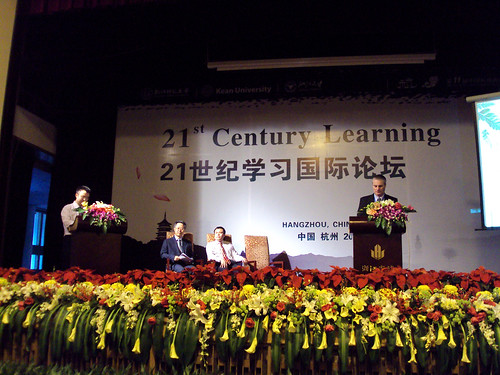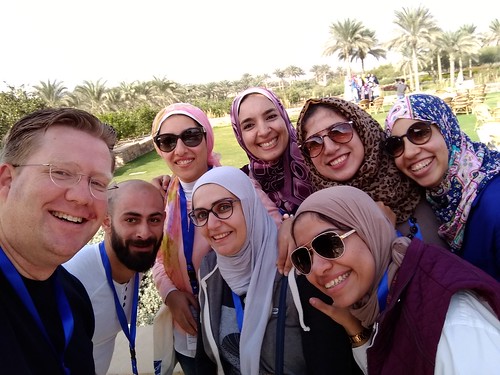Reflections on AI, China-U.S. Relations, Education & Innovation
Author: Wesley Fryer
Go to Source
The rapid improvement of artificial intelligence (AI) / machine learning algorithms and systems is one of the most important technological trends to study, discuss, and understand today in 2020. In addition to the adult Sunday School class I’m teaching this year, which is using a book on artificial intelligence as a guiding text (“2084: Artificial Intelligence and the Future of Humanity” by John C. Lennox @profjohnlennox), I’m talking to my 5th and 6th grade Media Literacy students about AI and the growing conflicts the United States and China are having over AI technologies as well as other issues. Today as our “Wonder Link” for my 5th grade Computer classes, we discussed a recent new video by Newsy highlighting the latest update in the TikTok controversy making headlines. A large number of my students, even though they are not 13 yet, have and use TikTok accounts. The possibility that TikTok could be shut down has their attention, but none of them have professed an understanding of the possible “national security” issues at stake with the app and the facial recognition data its owners collect.
The November 2019 PBS Frontline special, “In the Age of AI,” is two hours long and a FANTASTIC documentary. I’ve asked our Sunday School class members to watch it, and we’ve been discussing it in two different parts. The first part of our discussion was on September 13th, the second part is this coming Sunday, on September 27th. That recorded Zoom video and the accompanying slides will be added to our archived classes webpage. The documentary is divided into five parts, and I HIGHLY recommend you watch it in its entirety.
The velocity of change with AI is really staggering, and the impacts of AI (both positive and negative) are already all around us. Smart digital assistants, smart speakers, language translation apps and websites, and self-driving vehicles are all examples. “Surveillance Capitalism” and its destructive effects on privacy and democratic governance are another. Escalating tensions in the relationship between the United States and China are also a big part of this. It’s difficult to ascertain how much of the political statements about China originating with our current President are political and how many real issues there are… But between 5G infrastructure pressure from U.S. intelligence agencies, and warnings about China’s ascendency in AI technologies, it’s clear to me these are real and significant conflicts which are not solely based on U.S. politics and political leaders’ re-election strategies.
In the course of doing research not only for our Sunday School class on the ethics and societal impacts of AI, but also for the weekly podcast I co-host with my Montana colleague and friend, Jason Neiffer (@techsavvyteach) – “The EdTech Situation Room” (@edtechSR), I recently ran across ANOTHER documentary series with the exact same title, “In the Age of A.I.” This series is a “YouTube Original,” however, and is hosted / narrated by Robert Downey Jr.
There are 9 episodes in the series, and so far I’ve just watched the first one and half of the second. This is VERY well done, and also HIGHLY recommended. I’ll be using some clips from this as start-of-class “Wonder Links” for discussions with my students in upcoming weeks.
In addition to the VERY positive health and medical applications for A.I. technologies, I’ve also found another possible reason for optimism. This may sounds strange to term, “optimistic,” so I’ll explain in detail. MIT’s Scratch Programming language and website is banned in China.
The reason I wonder if this could be a cause for optimism is that INNOVATION has relied historically on the OPEN access to other ideas, and the ability to build on those ideas. As a heavily censored and ideologically regulated society, China has big problems with homegrown innovation. Since I went to China with my wife, Shelly, for the first time in 2007, China has made huge gains in its technology sectors, utilizing intellectual property theft and copying technologies as well as MASSIVE government investments to now being on the cusp of LEADING artificial intelligence development worldwide.
The August 26, 2020 episode of the “War College” podcast (now “Angry Planet”) was titled, “Why the U.S. May Come Out on Top Against China,” and it featured an interview with Matthew Kroenig (@matthewkroenig).
Like Kroenig, I want to remain optimistic that the comparatively free and open society of the United States and “the West” will ultimately triumph over the repressive, relatively closed, and authoritarian political and economic culture of China in 2020. We need to leverage all the advantages we have in the West when it comes to innovation and creativity. When Shelly and I returned to China in 2009 to Hangzhou, to a “21st Century Learning Conference,” we were specifically addressing the ways to encourage creativity and innovation in very traditional Chinese schools and school systems.
I presented alongside Joe Lambert, of the Center for Digital Storytelling (now “Storycenter,”) about the power and positive learning potential of digital stories. I didn’t present and share about the power of the Scratch programming language and the Scratch online community, but I’ve been thinking more lately about how IMPORTANT it is.
Whether we’re talking about China, the Middle East, or anywhere else in the world, leaders are interested and concerned about where CREATIVITY and INNOVATION come from, and how to encourage, nurture, and develop creativity within schools and communities. Repressive regimes are also wary of free expression and open access to ideas, however, and this key difference between our cultural norms in “The West” and those in other countries is a key part of the competitive advantage which we have enjoyed historically (speaking in the relatively recent past) as well as today.
I consider myself to very much be on a continuing journey of discovery when it comes to AI technologies and the impacts they are having and will have on our local, national, and international cultures and lives. I encourage you to watch the PBS Frontline documentary and YouTube Originals series videos I’ve linked in this post about artificial intelligence… and importantly, TALK ABOUT THEM with others. Share them with your family, your friends, your colleagues, and others with whom you have contact.
AI is and will continue to dramatically shape our world. As Douglas Rushkoff (@rushkoff) argues, we’re living in the age of “Program or Be Programmed.” This does not mean we all need to become college computer science majors and computer coders, but it DOES mean we all need to be much more conversant about computer algorithms and the ways they shape our lives and society.
It DOES mean all our students need to be provided with opportunities to code and develop their creative abilities to express themselves through algorithms in school, however. It breaks my heart that like China, some of the public school districts in Oklahoma (at least 1 of which I’m aware) block all student and teacher access to the Scratch community. Advocating for Scratch coding and other kinds of creative, expressive coding inside and outside of schools is an important response we can each embrace in the face of all this large scale, A.I. powered change.
We need smart, kind, ethical, collaborative leaders to help us move further into the 21st century. The students in our classrooms today will be the CEOs, elected representatives, judges, and national leaders of tomorrow. We need to invest in public education, invest in journalism, and work together to inspire a new generation of students to develop confidence and skills in coding and with algorithms.
Geeks are inventing the future today. Whether it’s a future dystopia or “Star Trek +” culture depends to a large degree on the quality and character of leaders. It’s up to us. Humanizing, empowering educational experiences offer our best path forward into these changing times. We’ve all got important roles to play!
If you enjoyed this post and found it useful, consider subscribing to Wes’ free, weekly newsletter. Generally Wes shares a new edition on Monday mornings, and it includes a TIP, a TOOL, a TEXT (article to read) and a TUTORIAL video. You can also check out past editions of Wes’ newsletter online free!
Did you know Wes has published several eBooks and “eBook singles?” 1 of them is available free! Check them out! Also visit Wes’ subscription-based tutorial VIDEO library supporting technology integrating teachers worldwide!
MORE WAYS TO LEARN WITH WES: Do you use a smartphone or tablet? Subscribe to Wes’ free magazine “iReading” on Flipboard! Follow Dr. Wesley Fryer on Twitter (@wfryer), Facebook and Google+. Also “like” Wes’ Facebook page for “Speed of Creativity Learning“. Don’t miss Wesley’s latest technology integration project, “Show With Media: What Do You Want to CREATE Today?“





